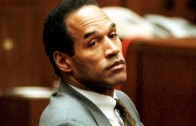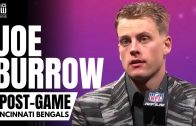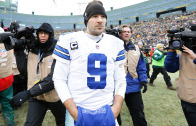Fanatics View Words: OJ Made in America Documentary Review
The white bronco; the glove; the circus trial and the turmoil that took place between the LAPD and the black community in Los Angeles in the 1990s. There’s a lot of painful images that come to mind when thinking about the OJ Simpson trial in 1995, and those are just some of them.
In Ezra Edelman’s ESPN 30 for 30 five part special “OJ Made in America,” these images and more are dissected and presented in a compelling story that looks at both sides of the case along with several narratives that help make up the entire OJ Simpson story.
At the end of it, you’re left wondering if you should feel sorry for the guy, or if you should hate him with a passion.
Part one of the segment looks at the OJ that most of us don’t know. He was the definition of an American hero. Graduating from USC as the star running back on his football team, the future was bright for OJ and his football career. He was drafted first overall to the Buffalo Bills in 1969 and he was ready to dominate the league— and he did that, easily, setting records in being the first football player to rush over 2,000 yards, and still holding the record for the single season yards-per-game average, which stands at 143.1. With his ungodly talent, his charismatic personality and his good looks and charm, it didn’t take long for fans to fall in love with the confident and fun-loving OJ.
But there was more to OJ Simpson, even early on in his career that people didn’t know. The documentary builds up his story by interviewing some of his childhood friends. In their interviews, they recall all of the times that OJ was able to get away with things, getting himself into trouble but managing to escape it every time. They also talk about OJ’s disregard for obeying rules. His friend and golf partner recalled OJ’s complete disrespect for the rules of golf—a gentlemen’s sport— when they would play. When he was on the course, he would hit the ball in the woods and would place the ball wherever he wanted. His lack of conscience and his ability to pass through life like he was a gift from God were a constant theme throughout his entire life.
The other theme that was presented well in the special was OJ’s ability to transcend race. OJ didn’t identify as a black man. He was OJ. He made a name for himself, got himself out of the ghetto in San Francisco and into the rich Brentwood, California community, and to him, that was all that mattered. This presented another theme with OJ: his extreme selfishness. His first wife— who he had three children with (one drowned as a two year-old)— was his best friend’s girlfriend. His house was filled with his trophies, medals and pictures of him. He was greedy, manipulative and obsessed with fame. His obsessions didn’t just stop there, however. OJ met Nicole Brown after she served him and his friends at a night club in 1977. She was 18 at the time and OJ was instantly enthralled. He set out to marry her, despite being married to his first wife, Marguerite at the time.
The documentary then goes into Nicole and OJ’s relationship, which started loving and intense until turning volatile, obsessive and ultimately violent. Edelman does a good job at getting all sides of the story, and presenting all sides of OJ Simpson— the good, the bad and the ugly. Throughout the series, you go back and forth between loving him and hating him. You go back and forth between feeling hatred toward the LAPD, sympathy for the blacks in LA that had to deal with the injustice, and anger towards everyone that backed OJ Simpson throughout his trial.
The interviews throughout the series were compelling, with several taking place with OJ’s childhood friends, billionaire friends, former agents and lawyers Marcia Clarke, Carl E. Douglas and F. Lee Bailey, Nicole’s little sister and multiple members of the controversial jury. What was interesting with these interviews was some of the lawyers on OJ’s defence team and some of his childhood friends still believe that he was innocent. They still believe that Fuhrman planted the infamous glove. Some of the jurors on the other hand admitted that they knew that OJ was guilty, but they used the case and ruling him innocent as a way to get back at the LAPD for all of the injustice blacks faced over the years— especially with the Rodney King case that happened just a couple of years before.
In terms of the murders, the documentary manages to cover the topic fully, including very disturbing up-close pictures of both Nicole Brown and Ron Goldman’s mutilated bodies and giving a detailed explanation as to how the murders took place on the night of June 12, 1994.
The documentary also shows extensive coverage of the actual trial, which at the time was broadcasted and watched by millions all over the world like a soap opera.
Ezra Edelman covers the entire story, front to back, not missing anything in between in this riveting documentary. “OJ, Made in America” leaves you wondering: What if? What if the police took Nicole Brown’s cries for help seriously? What if all of the turmoil between the LAPD and the black Los Angeles community wasn’t taking place at the time? What if Mark Fuhrman wasn’t the cop chosen to be on the stand? What if it all happened differently? OJ still wound up in jail for a completely different, stupid crime that took place 13 years later. Karma came back to bite him, big time. But it all could’ve played out very differently, and it all could’ve been prevented, too.
The documentary does an exceptional job at not presenting any biases; simply just presenting the facts of the case and the facts of OJ as an athlete, a celebrity, a spokesperson and a man. It shows the rise, the action-packed life and ultimately the bitter fall of an American hero.










